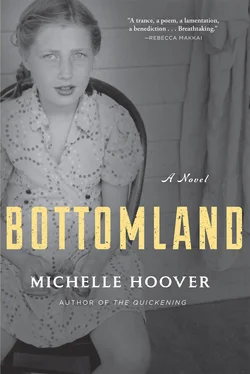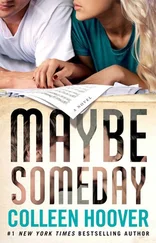“A fox.”
“I’m tired of foxes.” She lifted the soles of her boots as if to show me how they ached.
“Remember?” I took her hand to pull her along, but she shook her head. The way she left her bed for mine when she was scared to sleep, I reminded her, and the picture in the magazine. Do you dread the day? the advertisement said. Does washing tire you? Do you feel discouraged by the weary monotony of the old way? The woman in the picture wore a pink dress, a black square of ribbon on her collar and sleeves. In a washhouse, she stood with her hand on a crank, the other palm up as if holding a cup of tea, and not so much as a blush of heat on her cheeks. Father would have my hide for looking, let alone taking the magazine from the market for free, but I had to think someplace there were women like this. Hurley’s Electric Washers , the advertisement said, of Greater Chicago . I kept that magazine under the mattress ticking, folded it in a newspaper should Nan change the sheets.
“That’s somebody, isn’t it,” I told Myrle.
She pressed her hand flat against the picture. “She looks a queen.”
“A princess better.”
I dropped my hand on hers and lined up our fingers. Mine were longer by an inch. “See,” I said. “She’s as pale as you.” Myrle’s eyes were puffy, a streak of wet on her cheeks. The Elliot boy, that’s what that streak was. The magazine was the only thing that made her stop whimpering long enough to sleep. The light of the washroom in that advertisement, so bright it could kill shadows. Electric, always electric, when we might as well have lived in the bottom of a hole. Myrle curled her knees to her chest waiting for a story, and I would give her one if she wanted. Back then, I would have done anything for her.
The moon had come and gone again as we walked. The scrub in the ditches nicked us, our ankles bare enough for a bite. That fox, I wondered if it was trailing us on soft feet. But we would be fine as long as we stayed to the road and Myrle stopped her shivering. The way we made our plan, I was quick to remind her. The washing we wouldn’t have to do, and the cows left in their stalls for someone else’s buckets. Ray’s voice out of our heads and Patricia’s, Nan and her swollen fingers, pinching, poking, ordering us to break our backs. But Myrle whimpered again. “Esther,” she said. “What about.?” “Hush,” I said. The pictures in the magazine, I reminded her. And Father’s hand wide as my backside, me in my britches. It was one slap for talking back. One for tracking mud in the house. Two for freeing horses, and more slaps than I could count for stealing magazines. Did Myrle remember that? My ears rung to aching. My stomach sore against Father’s knees. Father with his eyes closed, his wheezing. Nan called up the stairs, “She’s learned her lesson.” But Father was in such a state. Wild, he said of me, though he didn’t know how much.
I ran to the cellar after every one of those lessons. The door was a heavy plank. Underneath, the wooden steps, cobwebs, and jars of what we saved from the garden, full to the brim. The ceiling was high as my head. The walls of dirt throbbed with beetles and worms. I breathed it in, that dark cool on my cheeks. Father was always quick with his slaps with me. No one else, especially Myrle, who he treated like a queen. If I closed the cellar door and pinched out the wick of my lantern, it was a cold, silent place where I could sit by myself with my knees to my chin. It was dark as dark then, the way it was those nights when I had to hold the rope from the barn to keep from losing my way to the house. If the air was warm, there wasn’t any difference between me and it. My bones and skin, they were gone as easy as pinching wicks, gone as Father wanted me to be, and I was nothing but quiet and no one could find me. At home, that dark was all I was.
On the road, the sun was coming. The farms were spotty, the houses emptied, the barns boarded like thieves and not a noise. I laid our blanket flat under the cover of bushes. We dropped to eat. “Just a break,” I told Myrle and took out the bread, a slice of cheese I’d hidden in my bag. The bread tasted of nothing. The cheese even less. She chewed at the food in small bites, half asleep. The ground was cold but thawing. With the wind, the bushes caught our hair. It was a fine place for stopping, out of sight of the road and not a farmhouse. Only a wide trail of grass in every direction. Far off, the smell of a wood fire, but not any smoke we could see. Myrle used her bag for a pillow. An hour or two before we needed to get going, just enough to rest our feet. Already we’d walked six miles, maybe seven. We had hours of sun to make the train. Myrle was breathing easy, huddled as she was and her eyelids jumping. I knew what she dreamed. It was always the same.
The Elliot boy. At home before we went to sleep, she’d told me every little bit. The smell of him, musky and warm, different from what she’d thought. His fingers on her back, teasing her neck. His hands so large she imagined he could hold all of her at once. The first time he helped her climb into the loft, made sure she didn’t slip. His mother was gone by then, ours too, and Lee finally home, but not by much. After the war, none of them came back, not all the way. The Elliot boy had holes in him you couldn’t really see. “Look,” he said when he showed her the scar on his belly. In the loft, he showed her the money he’d buried too. He had a tin box, and inside it, a heavy roll of bills. “I can take care of you, see?” he said. “With what they paid me at least.” That’s when he asked if Myrle wouldn’t mind lying down for a rest, and she said she didn’t. The Elliot barn wasn’t the same as ours. The loft pushed into the rafters and the boards gaped, wide enough you could spit on the cows and the hogs below fast asleep. He touched the collar of her dress, brushed her stomach between the buttons of her blouse. Bursting, he seemed, as if all he needed was at his fingertips. He touched her lower then. “Please,” he said. “You’re the prettiest little thing.” The way he asked her, she’d never been wanted so much.
I couldn’t help it. After she went to sleep, I imagined I was the one in the loft with him instead.
Months later, the gossip at the dinner table. “The Elliot boy’s gotten himself engaged,” Patricia said. Myrle hid her face. The prettiest , he’d told her. He must have changed his mind.
But it was after that, after what Patricia said. The boy asked Myrle to meet him behind their old smithy. Said he was sorry. His father, he told Myrle, that’s all it was, because Old Elliot would never take a Kraut for a daughter-in-law. Still, maybe he could make it right. He stood there shivering, an arm too heavy on her shoulders. The smell of his breath was like milk from our cow. She’d worn her Easter dress for him, thinking something nice might change his mind. So he took her hand gentle like, got her up in that loft again. He got her to lie down for a rest too, but it was different this time. Only later did I see how different it was. “He never said a thing,” Myrle said. Just did what he usually did, only hard as knives and twice as fast. His mouth smothered her. His shoulder bucked her chin. And after he finished, he threw himself off as if he’d never wanted to touch her. He didn’t help her down that ladder, though her dress was ripped. Didn’t wait for her to make it out the barn door. He ran, she said. Like he was scared of himself. All the times before, she’d thought this Tom might be someone. A Tom who whispered sweet things. But that Tom was gone, and she was skin-sore and shivering, making her way through the fields alone.
It was near dark. The grass was full of midges, hoppers too. They scared her with the way they flew up at her feet. She was lucky I saw her coming, looking after her the way I did. Her cheeks were scratched, her lips bitten. I drew her into the washhouse quick. She had more scratches on her legs, the straw splinters in her so deep I had to use pliers. But the worse of it was the bleeding, like he’d tried to split her in half. I scoured her drawers that were nearly black. Her dress I shredded for the rags. Her skin I scrubbed raw of fingertips and everything else. After Tom’s wedding, Myrle hid herself in bed in a sweat, everything that boy put in her pouring out. Sick, I told Nan. Nothing else. We kept our door closed, the lamps bright, our food untouched on plates in the hall. I tried to imagine what it was like, being wanted so much it left scars.
Читать дальше












